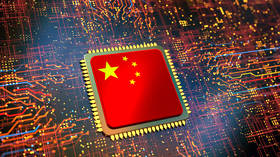Russia and China should build a joint semiconductor industry

The United States has recently imposed some of the toughest semiconductor-related sanctions it has ever imposed on China. Using the “foreign direct product rule”, which prohibits the use of American origin technology to the sanctioned party, even for third party countries, the White House has banned China’s entire semiconductor industry from utilizing US-led chipmaking equipment, in a bid to slow down its rise in chip technology. It is the same move the US used against Huawei two years ago, but on a larger scale, and demonstrates President Joe Biden’s willingness to double down on confrontation with Beijing, forcing it to pursue a path of self-reliance in semiconductors.
The foreign policy of the United States involves actively destroying globalization in a bid to shore up American unilateral dominance and undermine competitor states. Although the US once believed that globalization served American goals and interests, the story of US policy since Donald Trump became president has been that the mutual integration of US allies and rivals, through trade and investment, is bad and contrary to American interests. Therefore, the United States strives to engineer global political confrontation in order to maintain its critical strategic advantages and divide the world into respective blocs again, so it can legitimize its position through ideology.
While Trump only cared about China, Biden has escalated this to a whole new level and unleashed a dual confrontation against both Moscow and Beijing, heating conflict and tensions up to levels not even seen in the original Cold War. This means, like it or not, that China and Russia will continue to be each other’s strategic partners amid the aggression shown by the United States via NATO and Ukraine, as well as concerning Taiwan. While China has long been risk-adverse, advocated stability and strived to integrate further with the West, being cautious in its actions, America’s latest moves show that no matter what Beijing does, Washington will continue to pursue decoupling more and more, and the world is not going to go back to the way it was. Therefore, China cannot depend on the West to realize its economic and technological goals.
In this case, China should, irrespective of Western sanctions, take a long-term perspective and recognize that deeper economic integration with Russia is a necessity, not a side-show of lesser priority. China’s bid to shore up greater economic relations with the wider West has been sabotaged by the US, who as the above shows, deliberately ignites geopolitical confrontation to force its allies into compliance, as seen regarding NATO and Ukraine. What happened to China’s Comprehensive Agreement on Investment (CAI) with the EU? It was undermined by the US, which used the Xinjiang issue to initiate tit-for-tat sanctions to sabotage it. What is happening now to China’s attempts to better integrate with its neighbours in Southeast Asia? The US is again trying to create Taiwan tensions to foster uncertainty and force countries to take sides.
As this happens, the US is making more and more moves to formally exclude China from the global semiconductor supply chain. It has also done the same to Russia. As the window for US tech closes, Russia and Moscow must intensify the scope of their common cooperation, innovation and investment in the field of semiconductors. The US is already building a new supply chain around itself. As it imposes sanctions on Beijing, it has strong-armed scores of semiconductor companies into building new capacity in the US and approved massive subsidies aiming to establish an “America First” global chip supply chain which rival countries are locked out of. China for a long time has been investing billions into its own path of self-sufficiency, but it not should try to do so alone, or for that matter without its most critical strategic partner, who is in the same boat.
Russia and China are perfectly complimentary in this endeavor. First of all, China possesses surplus capital, expertise and other resources, with an increasingly educated workforce which excels in scientific fields. On the other hand, Russia possesses the critical natural materials required to make semiconductors. On a domestic level, Russia has struggled to establish a chip industry and has made limited progress since the end of the Cold War. Facing Western sanctions and technology embargos, Russia’s strategy should be to seek Chinese investment into its chip sector, increase the number of educational and scientific exchanges with Beijing on this matter, and strategically prioritize materials required for chipmaking both domestically, and in trade with other countries. This of course will be a long and difficult task, given that the priority must be to build an entire new supply chain and foundational technology from scratch. The United States is striving to use its “bottlenecks” in key technologies to squeeze China, meaning these technologies must be re-created again or in new forms.
The original Cold War was about two competing military and technological blocs. The US is deliberately making the world that way again, like it or not. China clearly prioritizes its economic growth and development, and doesn’t want bloc confrontation. It has done well at that, but it must not be under illusions now about the world it lives in, and must strive to pool its massive resources, population and expertise to help other countries too.
The United States believes its foreign policy can both cripple Russia and stifle China. In which case, Beijing must be prepared not to rely on rapidly evaporating western goodwill, but to engineer new markets and opportunities and build a new coalition to hit back against the American semiconductor strategy before it is too late. The US has crossed a line in cutting out an entire sector of the Chinese economy from its exports, unprovoked. In which case, Beijing should not try to appease the demands of ultra-hawks in Washington who demand its compliance on Ukraine while slapping on more sanctions, and make its partnership with Moscow “no limits”. It must not be allowed to crumble in the face of American intimidation.
The statements, views and opinions expressed in this column are solely those of the author and do not necessarily represent those of RT.














